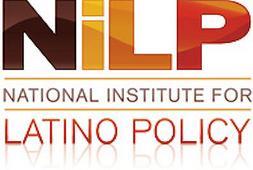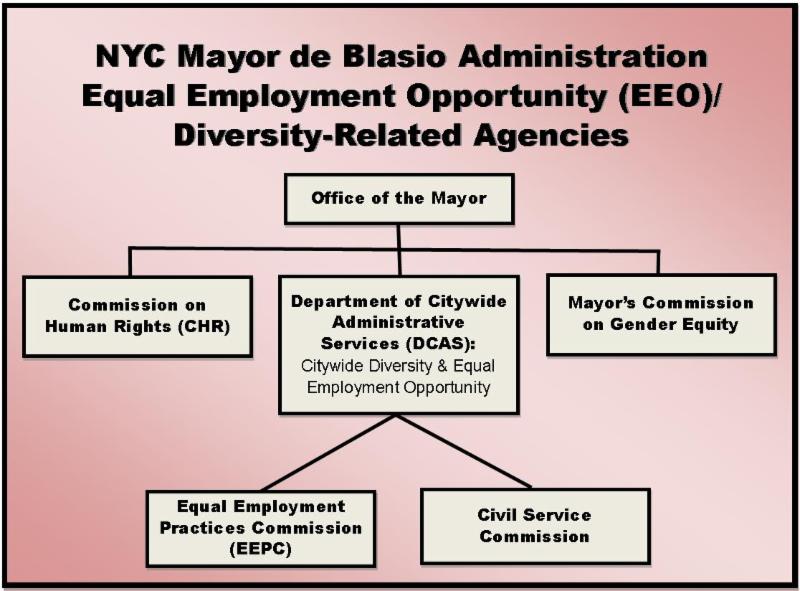
Testifying on Latino Underrepresentation in New York City Government
The NiLP Report
Addressing the Underrepresentation of Latinos
in the NYC Government Work Force
Testimony before the
Joint Hearing of the
Committee on Civil and Human Rights and the
Committee on Civil Service and Labor
By Angelo Falcón
President, National Institute for Latino Policy (NiLP)
Monday, April 23, 2018
Council Chamber, New York City Hall
Thank you for inviting me to testify before you on Council proposals to improve the city's equal employment opportunity programs for women and communities of color. We appreciate the opportunity to present our recommendations for change to the members of both the Committee on Civil and Human Rights and the Committee on Civil Service and Labor.
The last time I was in the vicinity of City Hall was in February 2014 when hundreds of Latinos came together to protest Mayor de Blasio's exclusion of Latinos from his appointments. Since that time, Latino community activists sought a meeting with the Mayor to discuss their concerns, a meeting he never granted. So we appreciate being here today to address our concerns. There remains deep resentment within the Latino community that the de Blasio Administration is failing to adequately represent Latinos in city government. The City Council's decision to give our concerns a hearing is a good first step in beginning to make up for the Mayor's indifference.
During the Mayor's first term, the National Institute for Latino Policy (NiLP) released a number of reports on his track record on Latino appointments, documenting the extent of their underrepresentation. As we have done since the Ed Koch Administration and through those of David Dinkins, Rudolf Giuliani and Michael Bloomberg, we also monitored the city's employment of Latinos in its overall workforce, where we found as well a persistent Latino underrepresentation. The most recent data available indicates that:
- Despite making up 29 percent of the city's population, 27 percent of its labor force and being one of the fastest-growing segments of the population, Latinos make up only 20 percent of municipal employees.
- Outside of the Police Department, whose staff is 24 percent Latino, our community's representation in other vital city agencies drops to 17 percent.
- We constantly hear complaints of the lack of upper mobility by those Latinos currently in the municipal workforce.
- There is also a problem with the current racial segregation of the city's agencies. While Whites are a majority of the employees in 11 agencies, Black employees are majorities in 5 agencies. This is as unhealthy a situation as that occurring in housing and the schools.
The long-term underutilization of Latinos in the municipalworkforce indicates that the city government's diversity mechanisms and processes have not been working when it comes to our community. There is an urgent need to reassess the city's workforce diversity efforts as they relate to the Latino community as well as newly-emerging communities.
We have reviewed the three pieces of legislation proposed by the Committee on Civil and Human Rights to strengthen the city's diversity employment programs --- Intros 752, 755 and 756. We find their reliance on the very agencies that have been the problem points to the need for a more rigorous and comprehensive review of the city's EEO programs. We believe the changes they proposed will have very little impact on their effectiveness in making city government more inclusive of its Latino residents.
While this proposed legislation focuses on the role of the Department of Citywide Administrative Services and the Equal Employment Practices Commission, such a comprehensive analysis would need to also include the Civil Service Commission, the Human Rights Commission and the Mayor's Commission on Gender Equity. I would argue that taken together these agencies suffer from a very bad case of bureaucratic sclerosis and wasteful and confusing duplication of efforts. The result is a lack of focus and in the case of the central coordinating Office of Diversity and Employmemt Opportunities, it is lost in the vast bureaucracy of DCAS with a tiny staff.
Consideration should be given to consolidating the city's EEO functions in one independent agency that reports directly to the Mayor and City Council. Such an agency should have the resources and authority to adequately address the city's important and ever-changing employment diversity challenges. It would allow for a strong and much more efficient focus on its mission in contrast to the current system which is highly fragmented and duplicative of efforts.
Through our recommendations, we seek to address these goals:
- Take affirmative steps to increase the representation of Latinos at all levels of and across all agencies of city government.
- Promote a critical review of current equal employment opportunity policies and procedures to develop more effective approaches to promoting greater Latino inclusion in the city government workforce.
- Increase the transparency of city government's efforts at Latino inclusion in the municipal workforce and its overall equal employment opportunity programs, policies, and data.
- Develop a robust pipeline of Latino talent that can be recruited and hired by the city government.
- Develop incentives for city managers for more aggressively and creatively promoting workforce diversity in their agencies.
While our recommendations deal specifically with the Latino community, they also relate to improving the city's EEO efforts with all communities. We recommend that:
1. A critical review of the role of the key diversity agencies is long overdue: the Department of Citywide Administration Services, the Equal Employment Practices Commission, the Commission on Human Rights, the Civil Service Commission and the Mayor's Commission on Gender Equity. The city's diversity programs have become much too passive, defensive operations and do not have the authority or mission to aggressively promote workforce diversity.
2. The diversity workforce data and plans of each agency should be made transparent both centrally and for each agency individually. We recommend that the city mandate that each city agency, board, and commission provide both EEO data and the diversity plans on each of their websites on an annual basis to increase their accountability on this issue.
3. Also regading transparency, the city needs to significantly revise the format of its annual EEO-4 reports on the agency work force racial-ethnic and gender breakdowns. They currently provide these data only for 12 general functional areas as opposed to each agency. One of these areas, for example, "Financial Administration and General Control" groups 50 agencies, including the Mayor's Office, making it useful as an indicator of anything. Also, these EEO-4 reports present the data in the most user-unfriendly formats, such as not providing citywide totals, not providing percentages and only presenting them in a non-digital format. These reports also inexplicably exclude the Department of Education, which is under Mayoral control.
4. Each agency commissioner and head should be made responsible for developing plans for the desegregation of their agencies and to promote the full diversity of their workforces. This should include promoting agency plans for both internal vertical and horizontal workforce mobility as well as outreach to underutilized communities.
a. Each head of a city agency should be required to annually hold a major meeting with their agencies major Latino stakeholders to discuss Latino community concerns about staffing, resource allocation and other issues.
b. Each city agency should be required to establish employee affinity groups for Latinos and other protected classes, and a citywide coordinating body based in the Mayor's Office.
5. The promotion of workforce diversity should be made a core value of the city and managers should receive incentives for the progress they make in this area. As recognition of the importance of diversity for your Administration, we recommend that it be added as an indicator in the Mayor's Management Report.
6. Serious attention needs to be given to pipeline development issues for Latinos coming into the city government's workforce. There is a need to develop an inventory of the various internships, fellowships and related programs that seek to develop and recruit new talent to see how they have been utilizing Latinos. Are existing programs doing an effective job? Do they need to be reorganized, or new programs be recruited? Is the city fully utilizing the potential role that the City University of New York and the Department of Education can play in promoting public service among the city's Latino youth?
We hope you find these recommendations useful as you seek to create a New York City government fully reflective of the population it serves. If we can be of further assistance, do not hesitate to reach out to us. Thank you.
Angelo Falcón
President
National Institute for Latino Policy (NiLP)
337 South 4th Street
Brooklyn, NY 11211
347-987-3548afalcon@Latinopolicy.org
Twitter: @TheNiLPnetwork
APPENDIX

Related
"A Socioeconomic Profile of NYC Mayor de Blasio's Latino New York City" By Angelo Falcón, The NiLP Report (February 15, 2016)
"Latinos on the New York City Council Payroll" By Angelo Falcón, The NiLP Report (January 22, 2018)
"Continued Latino Underrepresentation in the New York City Government Workforce: 2017" By Angelo Falcón, The NiLP Report (January 16, 2018)
Maintaining White Male Privilege in NYC Government? By Angelo Falcón (New York: National Institute for Latino Policy, February 2016)
"Stop Pissing on Us! Trickle-Down Progressivism and New York's Latino Community" By Angelo Falcón, The NiLP Report (February, 9, 2015)
_______________________________________________________________________________________________________
The NiLP Report on Latino Policy & Politics is an online information service provided by the National Institute for Latino Policy. For further information, visit www.latinopolicy. org. Send comments to editor@latinopolicy.org.